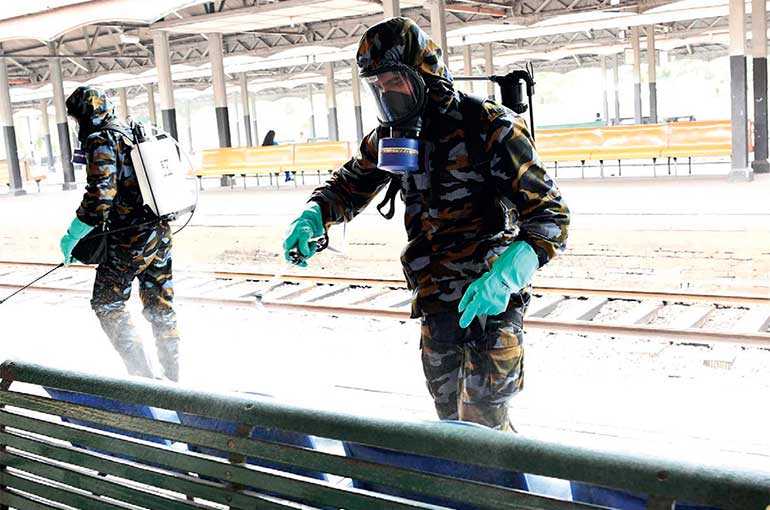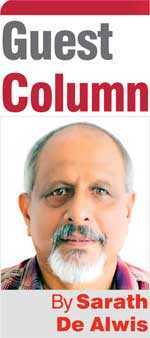Monday Feb 16, 2026
Monday Feb 16, 2026
Wednesday, 25 March 2020 06:22 - - {{hitsCtrl.values.hits}}

When the President said that the nation was secure, he was earnestly erroneous and felicitously
fallacious. Biosafety of the nation was seriously breached. Our biosecurity was severely undermined
– Pic by Shehan Gunasekara
I know that I have a highly inconvenient habit of speaking what I consider to be the truth rather than saying what may be expedient at the moment – Yevgeny Zamyatin, letter to Stalin, 1929
On Tuesday 17 March, President Gotabaya Rajapaksa concluded his address to the nation with a forthright, fearless statement: “This country, that’s yours and mine, is secure today.”
He exuded confidence. Confidence makes a leader to go forward with faith. The leader’s demeanor dispels doubt amongst officials. The President in the statement embodied courage and sincerity.
He was wrong of course. There is more to national security than contending with separatist terrorists and suicide bombers. Surveillance of religious fanatics, political dissenters and blabbering civil activists is not the same as discovering, observing, controlling and containing communicable microorganisms.
Natural outbreaks of unknown disease pose challenges to national and global security. They undermine national economies, international trade and travel and, public health. Such outbreaks undermine people’s trust in their governments. Biosafety and biosecurity are different disciplines. Biosafety is about protecting humans from germs. Biosecurity is about protecting germs from humans so that humans don’t infect other humans.
I have said it before. I will say it again. I did not vote for Gotabaya Rajapaksa. I do not want him to get a rubber stamp Parliament at the next Parliamentary Elections. I would be happier if he does not get a Parliamentary majority at all. An efficient no-nonsense executive president with the patience of a Marcus Aurelius is too much to hope for. Last I heard, hoping for accountability from an elected president was not unpatriotic or treasonous.
Although I question his purpose, I do not doubt that he is a purposeful president. We must appreciate his sincerity. We must comprehend the source of his confidence.
In these scary uncertain times, exploring the source of his courage and the fount of his sincerity is the point of departure of this essay.
After his address to the nation, on 18 March, the President made some consequential remarks at an official strategy meeting.
“As a country which did not go through a lock-down even during the 30-year war, there is no need to go for a lock-down in the face of the COVID-19 pandemic. The country needs to function.”
As Defence Secretary under President Mahinda Rajapaksa, he reminded the gathering, he was able to bring the  war to an end without shutting down any area.
war to an end without shutting down any area.
“We managed to defeat LTTE terrorism unlike other countries in the world. Other countries may have the best medical facilities, but we managed to cure infected people with our efforts.” [http://www.dailymirror.lk/top_story/No-need-for-total-lock-down-Prez/155-185183]
The gazette declaring COVID-19 as a quarantinable disease under the Quarantine and Disease Prevention Act was issued on 20 March.
At the time of writing this essay, the Government has extended the Police curfew until 27 March. We don’t look for the light at the tunnel. We don’t know the length of the tunnel.
When he said that the nation was secure, the President was earnestly erroneous and felicitously fallacious. Biosafety of the nation was seriously breached. Our biosecurity was severely undermined.
President Gotabaya Rajapaksa is not the first head of state to miscalculate the ferocity of the spread and to misjudge the scope of the horror that the COVID-19 pandemic would unleash on a global scale.
The President of China Xi Jinping was ahead of him.
On 31 December 2019, the Chinese President heralded the new year by delivering the longest speech he has made since he attained supreme power as President for life.
Xi Jinping dismissed pro-democracy protests in Hong Kong and asked the great people of China to look ahead for challenges and opportunities in 2020.
He promised, they would win a decisive victory in eliminating poverty. He called it a milestone significance in realising the first centenary goal.
He carefully avoided reference to the mysterious pneumonia reported by health officials in Wuhan in Hubei province. As he was speaking, the Chinese Government was alerting the World Health Organisation. The people of China were in the dark.
Xi Jinping wouldn’t allow some odd pestilence in Wuhan to unnecessarily worry the people of China.
The baffling new pneumonia virus had been noticed by Li Wenliang a self-effacing ophthalmologist at the Wuhan Central Hospital. On the app WeChat he discussed the virus that intrigued him, with some of medical school batch mates. Around seven patients were infected with an unspecified corona virus. It reminded him of the SARS virus.
This innocent exchange on WeChat landed the poor eye doctor in serious trouble. The local police questioned him and reprimanded him for his curiosity that was professional to him but inconvenient for the all-powerful party apparatus. He went back to work and contracted the unknown virus himself.
In the following two weeks, the Wuhan hospital authorities claimed that matters were well under control. But viruses are not deterred by despotic presidents. Unchecked the virus spread with the speed and consistency that nature intended for it.
On 20 January President Xi finally and publicly acknowledged the outbreak. The virus should be resolutely contained, he decreed.
Please note. These Presidents big or small are very resolute in what they do.
On 23 January Wuhan was placed in a lockdown. On 26 January Sri Lanka established our own task force to combat the virus.
We discovered the Chinese lady infected with the virus on 27 January. She was admitted to the IDH and recovered fully.
Our Minster of Health, daintily oblivious to the impending load of crap that will soon hit the fan, gave her a bigly big kiss and she left the island on 19 February.
Sri Lanka had expressed its solidarity with China in its hour of discomfort. Sri Lanka did not know the peril the big brother of road and belt fame was really in.
Back in China the COVID-19 virus followed its own dynamics. Wuhan the epicentre of the pandemic is known as China’s Detroit. It is home to hundreds of auto parts suppliers. On 12 February, Germany on Tuesday confirmed two cases of coronavirus infections in the southern state of Bavaria. The two new cases of coronavirus infections were detected among staff at an automotive plant in the Starnberg district west of Munich.
A Chinese employee of the auto parts maker Wabasso had tested positive for the virus upon returning to China following a visit to the headquarters near Munich. The employee apparently infected several German colleagues during the visit. That is the problem with the virus. It is carried by people who do not show any signs of the infection.
In Wuhan city, corpses lay unattended on pavements. The Guardian newspaper refers to a woman on a balcony of a luxury tower block striking a gong and crying to the heavens, “My mother is dying, rescue me!”
Li Wenliang the ophthalmologist was by this time lying on his deathbed. He was a loyal party member. That did not stop him from doing what he thought he must do. He spoke about the official failure of the State to impart essential and vital information about the virus to the public.
He told the Beijing-based journal Caixin something that will outlast the horrid memories of the pandemic as one of the unscalable summits that the free human spirit could reach in the last reflexes of a dying brain. “A healthy society cannot just have one voice.”
Tyrants can dream of neatly arranged societies that will work to a dead beat. But a vibrant harmonious human experience must have a ‘plurality of voices’ and not the single croak of a tyrant.
I am 77 years old. I have undergone coronary bypass surgery 10 years ago. A recent angiogram has shown two blocks which the good doctor with the reassuring name ‘Vivek’ says could be managed by medication.
My pendulum swings. Unless it comes to a pause I would like to live, to see my bright grandchildren finish university, in particular ‘Bins’ who will attend Cambridge next year. With great patience I explained to her that we should not hold Cambridge responsible for GL. Just as pandemics, aberrations happen to visiting fellows of Cambridge as well. I don’t wish to be asphyxiated by COVID-19-induced pneumonia. So, I scrupulously observe the lockdown. There is plenty to learn on the internet.
Two medical anthropologists Marcia C. Inhorn of University of California, Berkeley and Peter J. Brown of Emory University, Atlanta, Georgia have produced a paper in 1990 under the ambitious title ‘The Anthropology of Infectious Disease’.
Though lengthy its introductory remarks should earn the attention of the average perceptive mind.
Diseases caused by infectious agents have profoundly affected both human history and biology. In demographic terms, infectious diseases-including both great epidemics, such as plague and smallpox, have devastated human populations from ancient to modem times.
The lives claimed by unnamed viral and bacterial infections have claimed more lives than all wars and other natural disasters.
In the face of such attack by microscopic invaders, human populations are forced to “adapt to infectious agents on the levels of both genes and culture. As agents of natural selection, infectious diseases have played a major role in the evolution of the human species.”
Infectious diseases have also inspired or rather provoked cultural transformations.
Human groups have often unwittingly facilitated the spread of infectious diseases through culturally coded patterns of behaviour or through changes in the crucial relationships among infectious disease agents, their human and animal hosts, and the environments in which the host-agent interaction takes place.
The paper written in 1990 has anticipated the plight of the Chinese ophthalmologist in Wuhan and our Minister of Health who reached out to President Xi Jinping with her brave ‘kiss and tell’.
At the outset I said that point of departure of this essay was to find the source of the courage and the fount of the sincerity of the President when he said those memorable words, “This country, that’s yours and mine, is secure today.” His courage comes from the delusion that the war victory against the LTTE has no parallel in military history since Homers ‘Iliad’ and Vyasa’s ‘Mahabharata’.
His sincerity is the ‘stupor’ inevitable with untrammelled authority.
The Romans had a phrase for the predicament: Quis custodiet ipsos custodes? Who guards the guardian/guardians? The 19th Amendment was a feeble attempt and the President is not pleased with it.